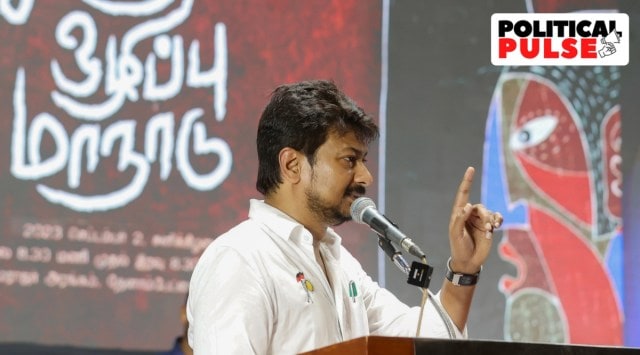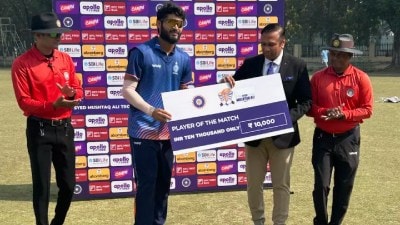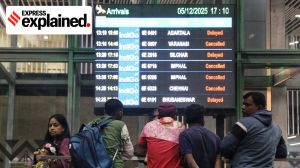Behind Udhayanidhi remarks, an anti-caste view of religion going back centuries in TN
TN scholars trace the view to Sangam period itself – in fact, to some verses that PM Modi himself quotes, such as "Yaadhum Oore, Yaavarum Kelir (We belong to all places, everyone)"
 Udayanidhi's words have deep roots in Tamil Nadu's political, and cultural, ethos. (PTI Photo)
Udayanidhi's words have deep roots in Tamil Nadu's political, and cultural, ethos. (PTI Photo) Tamil Nadu Sports Minister Udhayanidhi Stalin’s remarks against Sanatan Dharma have generated a controversy, with the BJP calling the same an indication of the “anti-Hindu” leanings of the DMK and INDIA coalition. However, in Tamil Nadu, Udayanidhi’s words have deep roots in the state’s political, and cultural, ethos.
With its longstanding tradition of social and religious critique, scholars in Tamil Nadu trace the view of Sanatan Dharma as a casteist and rigid system, to the Sangam period itself – in fact, to some verses that Prime Minister Narendra Modi himself quotes, such as “Yaadhum Oore, Yaavarum Kelir”. This translates to, ‘We belong to all places, and to everyone’, or a sense of belonging cutting beyond barriers, penned by Tamil poet Kaniyan Pungundranar 3,000 years ago.
V Arasu, a retired professor of Tamil Literature at the University of Madras, says: “Periyar’s self-respect movement started in 1925. But the anti-Sanatan Dharma, anti-caste sentiments were prevalent here for many centuries. They were taking the shape of a movement for at least 100 years, before the origin of Periyar’s Dravidian movement.”
Arasu refers to the works of Ramalinga Swamigal or “Vallalar” in the 18th century. “His writings were a scathing criticism of caste and every aspect of so-called Hinduism or Sanatan Dharma,” he says.
A 19th-century Tamil Shaivite holy figure, Vallalar – a contemporary of social reformer Sree Narayana Guru in Kerala – made an ideological journey from an ardent believer to a proponent of rationalist philosophy, much to the shock of his own disciples.
While his first five volumes of work depicted his religious life, his sixth Thirumurai (Holy Saying), believed to have been penned in the last nine years of his life, went so far as to dismiss rituals and blind belief as “garbage”. “Kanmoodi vazhakkam ellam manmoodi poka (Let all blind belief be buried alive)”, he wrote.
“His verses were specific and hard-hitting, appealing to people to destroy rituals and practices of religion and caste. In fact, Periyar published Vallalar’s verses in the first edition of his mouthpiece, Kudiyarasu, in 1927,” says Arasu.
Around the 5th century, Thirukkural – another text that PM Modi often quotes – also offered a counter-narrative to dominant thought. Arasu says that for a long time, its assertive stand against established beliefs and counter theories to divisive ideas, such as caste and unjust hierarchies, were seen as problematic.
Thirukkural was penned in the era following the reign of the Pallavas and the Cholas, with a corresponding rise in Brahmanical influence. As Brahmins took over the control of temples, received land grants and exemptions, and were given immunity from laws and punishment, discontent rose among non-Brahmins.
This sowed, in turn, the seeds of the Siddhar movement, offering a ‘bhakti’ path to largely the lower castes. Literature and poetry that captured the first-hand experience of oppression faced by these groups followed.
Vallalar was the last intellectual face of this movement, before Periyar revived it in the modern history of pre-and-post Independent India.
Tamil Nadu also had thinkers like Athipakkam Venkatachala Naicker, who penned critiques on the religious practices and cultural norms of Hinduism. Naicker’s Hindu Mathaachara Aabaasa Darsini (The obscenities of Hindu religion) critiqued the practices and cultural transactions of the upper castes.
Incidentally, all this happened around the 18th century, much before the British bundled many eastern faiths from the region into a single basket and first deemed it ‘Hinduism’.
By the late 19th century, Chennai city had a Madras Secular Society that propagated anti-caste ideologies, influenced by the London Secular Society of Charles Bradlaugh, an English politician and atheist.
Swami Vivekananda, an icon of Hindu philosophy embraced by the BJP, was once rebuffed by Tamil scholar-philosopher Manonmaniam Sundaram Pillai over a question on his gotra, linked to caste identity.
The story goes that Pillai, who penned the official Tamil anthem ‘Neeradum Kadaludutha’, was visited by Vivekananda at Thiruvananthapuram in 1892. During a conversation on sects and tribes in the then cultural system, followed by questions such as ‘Who is a Shaivite, Vaishnavite etc?’, at a time when Shaivites and Vaishnavites refused to be identified as all-encompassing Hindus, Vivekananda threw a personal question at Pillai: “What is your gotra?”
By 1925, Periyar had weaved these cultural narratives into a political movement that fell in the broad category of Dravidian thought.
The latest controversy comes at a time when the DMK is trying to tap into anti-BJP sentiments by pitching itself as not just a political but an ideological alternative, and also as a voice of the South – an area that the BJP has failed to conquer despite trying to shed its North India party image.
The DMK has taken an aggressive line against the BJP’s attacks over Udhayanidhi’s remarks, underlining this “difference”. On Monday, DMK chief and Udhayanidhi’s father M K Stalin began a podcast with the aim of taking this “distinctive”, anti-BJP voice to the people of the country.
Hence, while the BJP clearly hopes that Udhayanidhi’s comments will backfire on the Congress and other North India parties, which have been driven on the back foot on matters of religion by the BJP, the DMK believes it has the language to counter this narrative.
The controversy began after Udhayanidhi, speaking at a Chennai conference hosted by the Tamil Nadu Progressive Writers’ Association last week, said: “Sanatan is antithetical to social justice and equality. Like dengue, malaria and Covid-19 require eradication, not mere opposition, so does Sanatan.
- 01
- 02
- 03
- 04
- 05






























